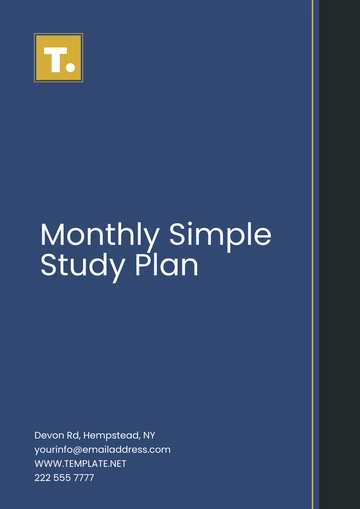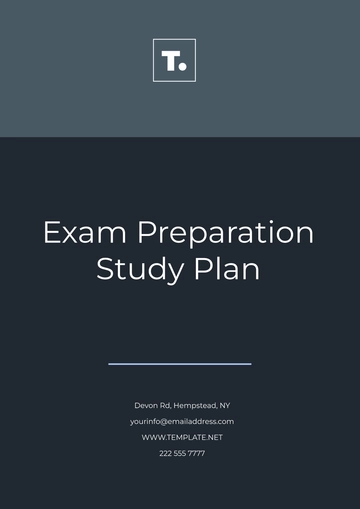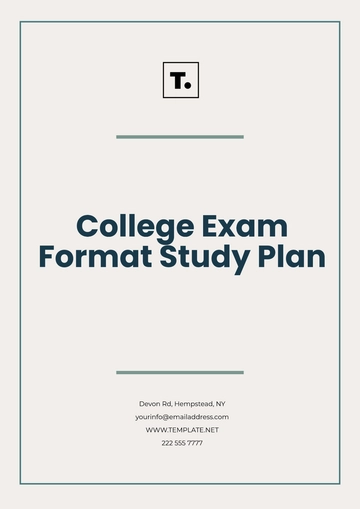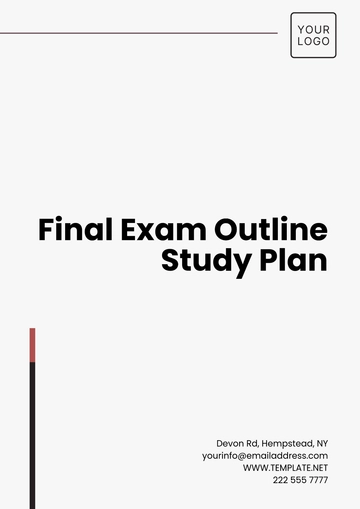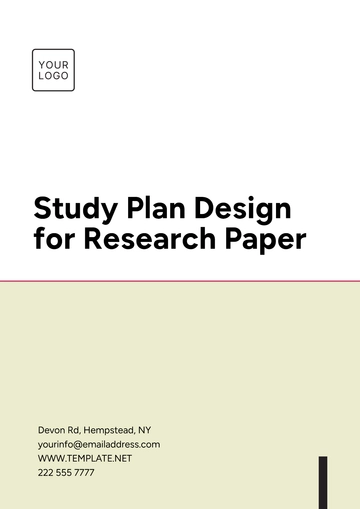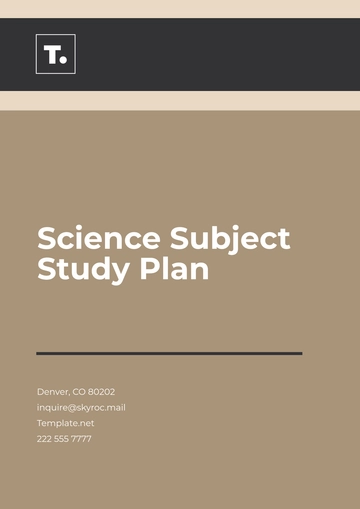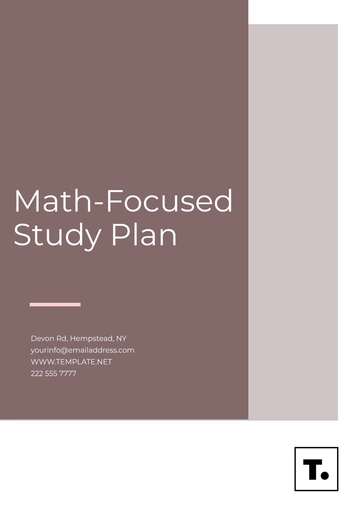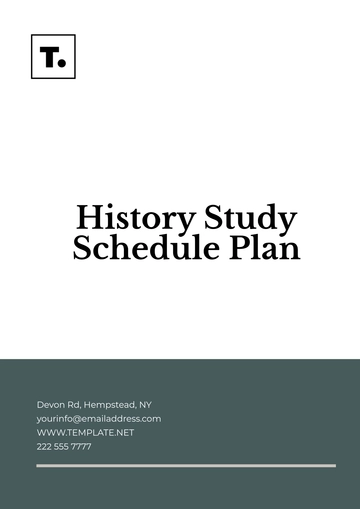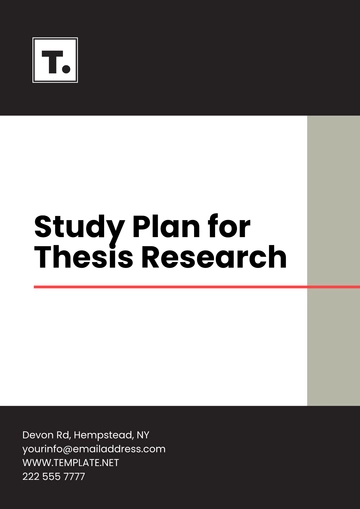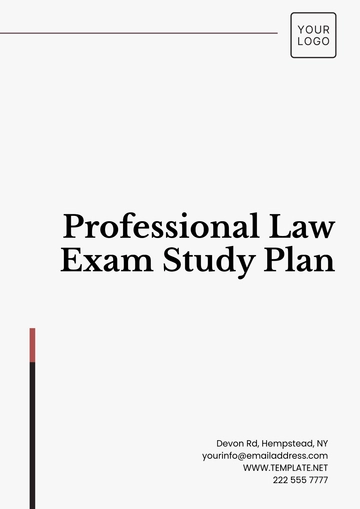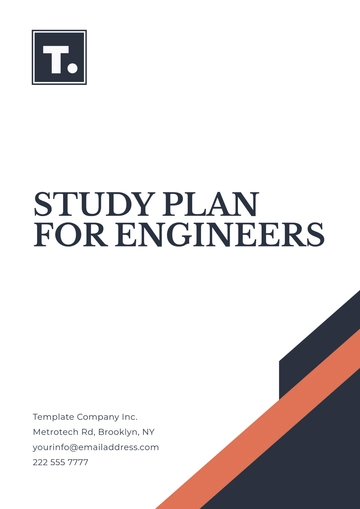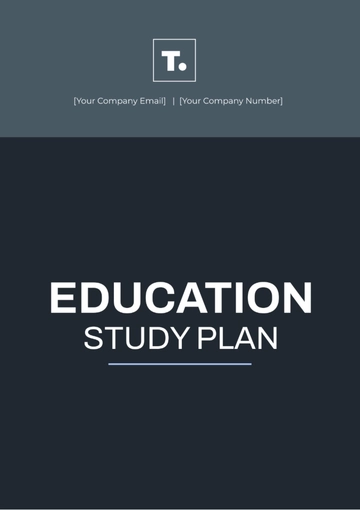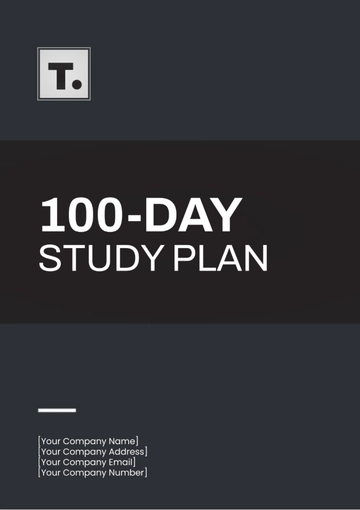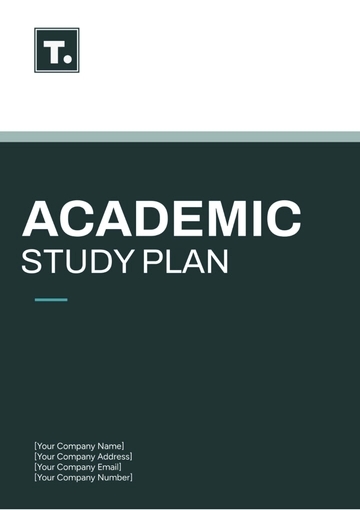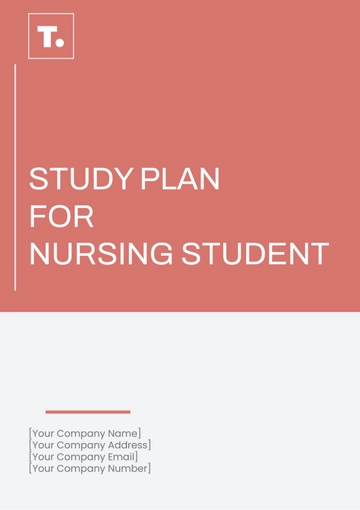Free School Study Plan
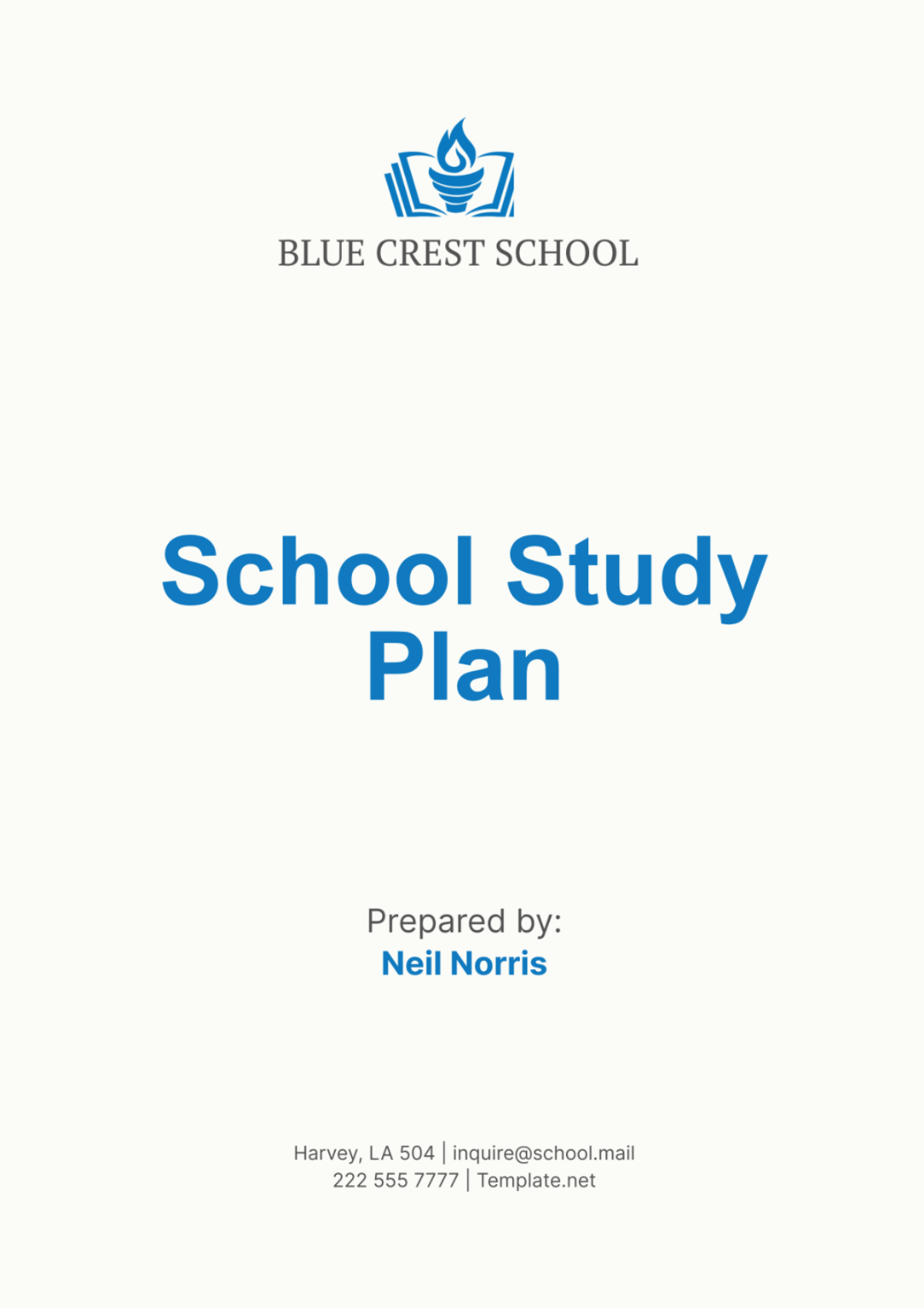
I. Introduction
In today's fast-paced academic environment, effective study habits are essential for success. A well-structured study plan not only helps students manage their time efficiently but also allows them to focus on key areas for improvement. This School Study Plan is designed to assist students in organizing their study schedules and maximizing their academic potential.
The primary goal of this study plan is to provide students with a clear roadmap to academic success. By outlining specific goals and objectives, allocating study time effectively, and tracking progress regularly, students can enhance their learning experience and achieve their academic aspirations. This plan emphasizes the importance of consistent effort and smart study strategies, aiming to empower students to excel in their academic endeavors.
II. Study Goals
Establishing clear and attainable goals is paramount to academic success. This section delineates both short-term and long-term objectives, offering students a roadmap to navigate their academic journey effectively.
Short-Term Goals
Improve time management skills to allocate study hours efficiently.
Enhance note-taking techniques for better retention and comprehension of study material.
Develop effective study habits, such as regular review sessions and active participation in class discussions.
Short-term goals serve as foundational milestones towards achieving long-term success. They aid in maintaining focus and motivation, facilitating incremental progress. Setting pragmatic short-term goals enables students to monitor their advancement and stay on track.
Long-Term Goals
Achieve a GPA of 3.5 or higher by the end of the academic year.
Gain admission to a prestigious university or college upon graduation.
Obtain a scholarship or academic award in recognition of outstanding academic performance.
Long-term goals provide students with a sense of purpose and direction. They act as a catalyst, propelling students to exert effort and persevere through challenges. Long-term goals embody the culmination of sustained dedication and hard work, leading to significant accomplishments.
III. Course Details
Understanding the specifics of your courses is vital for effective planning and study. This section provides key details about your courses, including the course name, instructor, duration, and schedule.
Course Name: | Introduction to Psychology |
Instructor: | Dr. Sarah Johnson |
Course Duration: | Fall Semester 2054 |
Course Schedule
Day | Time | Subject/Course |
|---|---|---|
Monday | 9:00 AM | Introduction Lecture |
Tuesday | 10:30 AM | Research Methods |
Wednesday | 1:00 PM | Case Studies |
Thursday | 11:00 AM | Group Discussion |
Friday | 2:30 PM | Exam Review Session |
IV. Study Resources
Achieving academic excellence requires more than just attending classes; it demands access to a diverse array of study materials. This section serves as a comprehensive guide to the textbooks and online resources essential for your study plan. By utilizing these resources, you can deepen your understanding of course materials, broaden your perspective through additional readings, and enhance your overall academic performance. Whether you prefer traditional textbooks or digital resources, this section aims to provide you with the tools necessary to excel in your academic endeavors.
Textbooks
Access to quality textbooks is paramount for academic success. The following list comprises recommended textbooks that align with the courses in your study plan. These textbooks cover essential topics and serve as valuable resources for your studies.
Textbook | Author | Publisher |
|---|---|---|
Textbook 1 | Author A | ABC Publishing |
Textbook 2 | Author B | XYZ Publications |
Textbook 3 | Author C | DEF Books |
Online Resources
In today's digital age, online resources are invaluable for supplementing traditional learning materials. The following online resources are recommended to enhance your understanding of course materials and provide additional support for your studies.
Online Resource | Website |
|---|---|
Resource 1 | www.example.com |
Resource 2 | www.resources.com |
Resource 3 | www.study.com |
V. Study Schedule
A well-structured study schedule is fundamental for effective time management and academic success. This section provides a suggested weekly study schedule to help you organize your time efficiently. By allocating specific time slots for studying, reviewing, and other activities, you can maximize your productivity and ensure that you cover all necessary material. This schedule is designed to be flexible, allowing you to adapt it to your own learning style and commitments. Consistency is key, so try to stick to your schedule as closely as possible to achieve optimal results.
Day | Time Slot 1 (9:00 AM - 11:00 AM) | Time Slot 2 (1:00 PM - 3:00 PM) | Time Slot 3 (4:00 PM - 6:00 PM) |
|---|---|---|---|
Monday | Read Chapter 1 and take notes | Review lecture notes and summarize key points | Complete practice problems |
Tuesday | Watch online lecture and make flashcards | Work on group project | Review vocabulary words |
Wednesday | Study for upcoming quiz | Read supplementary materials | Practice essay writing |
Thursday | Review previous assignments | Study in a quiet environment | Attend study group session |
Friday | Complete online quizzes | Research for term paper | Revise for upcoming exams |
Saturday | Review the week's material | Take a break and engage in a hobby | Attend optional review session |
Sunday | Prepare study plan for the upcoming week | Review weak areas and seek clarification | Reflect on the week's progress and set goals |
VI. Study Techniques
Implementing effective study techniques is essential for retaining information and enhancing academic performance. This section outlines various study methods that can help students optimize their learning process.
1. Pomodoro Technique
The Pomodoro Technique is a time management method that encourages focused work sessions followed by short breaks. To use this technique, set a timer for 25 minutes and work on a single task without interruptions. After the timer goes off, take a 5-minute break. Repeat this cycle four times, then take a longer break of 15-30 minutes. This technique helps maintain concentration and prevent burnout, making study sessions more productive and manageable.
2. Active Recall
Active recall involves actively stimulating memory during the learning process. Instead of passively reading or highlighting, students test themselves on the material they are studying. This can be done by summarizing information from memory, answering practice questions, or teaching the content to someone else. Active recall strengthens neural connections and improves long-term retention of information, making it a powerful tool for studying.
3. Spaced Repetition
Spaced repetition is a technique that involves reviewing information at increasing intervals over time. This method leverages the psychological spacing effect, where information is more easily recalled if it is studied several times spaced out over a long period, rather than crammed in a short period. Using tools like flashcards or spaced repetition software, students can schedule reviews to ensure that material is revisited just as it’s about to be forgotten, enhancing retention.
4. Mind Mapping
Mind mapping is a visual study technique that helps students organize information hierarchically. It involves drawing diagrams that connect related concepts around a central topic. This technique allows students to see the relationships between different pieces of information, making it easier to understand and recall. Mind maps are particularly useful for subjects that require understanding of complex structures and connections.
5. Group Discussions
Engaging in group discussions allows students to explore different perspectives and clarify their understanding of the material. During discussions, students can ask questions, exchange ideas, and explain concepts to their peers, which reinforces their own understanding. Group discussions also promote critical thinking and can reveal insights that may not be apparent when studying alone. This collaborative approach can be especially beneficial for subjects that involve problem-solving and analytical thinking.
VII. Evaluation and Feedback
Continuous evaluation and feedback are crucial for academic growth and success. This section outlines various methods for assessing progress and receiving constructive feedback, helping students stay on track and achieve their academic goals.
1. Self-Evaluation
Regular self-evaluation helps students reflect on their learning progress and identify areas for improvement. By assessing their strengths and weaknesses, students can tailor their study strategies to enhance their academic performance.
Weekly Progress Review
Monthly Goal Setting
Tracking Time Spent
2. Instructor Feedback
Instructor feedback is invaluable for guiding students' learning processes. Regular feedback from instructors helps students understand their progress, clarifies doubts, and provides direction for future studies.
Quizzes and Tests
Assignments
Project Work
3. Peer Feedback
Receiving feedback from peers offers different perspectives on one’s work. Peer feedback can highlight strengths and areas for improvement, promoting mutual learning and collaboration among students.
Study Group Sessions
Peer Reviews
VIII. Additional Notes
In addition to the structured elements of the study plan, it's important to consider other factors that can impact academic success. Maintaining a balanced lifestyle is crucial for sustained productivity and well-being. Ensure you incorporate regular breaks, physical exercise, and adequate sleep into your daily routine to keep your mind and body healthy.
Effective communication with instructors and peers is also vital. Don’t hesitate to ask questions during lectures or seek help when needed. Engaging actively in class discussions and study groups can provide new insights and reinforce your understanding of the material.
Utilize campus resources such as libraries, tutoring centers, and counseling services. These resources can offer additional support and guidance, helping you overcome academic challenges. Additionally, make use of technology to organize your study materials and schedule. Apps for note-taking, time management, and flashcards can streamline your study process and enhance your productivity.
Lastly, stay motivated by setting personal rewards for achieving your goals. Celebrating small successes can boost your morale and keep you focused on your long-term objectives. Remember, the journey to academic success is a marathon, not a sprint. By maintaining a positive mindset and proactive approach, you can achieve your educational aspirations effectively.
- 100% Customizable, free editor
- Access 1 Million+ Templates, photo’s & graphics
- Download or share as a template
- Click and replace photos, graphics, text, backgrounds
- Resize, crop, AI write & more
- Access advanced editor
Organize academic schedules effectively with the School Study Plan Template from Template.net. This editable and customizable template helps you create comprehensive and personalized study plans. Editable in our Ai Editor Tool, it offers a user-friendly experience, making it easy to tailor to individual student needs. Ensure student success with this essential study plan template.


